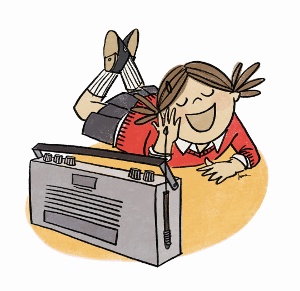Lighting the Candle: Boom Box
I used to drive my mother dizzy with my never-ending stories. There was always something to share. A short TV cartoon I’d seen could turn into three hours of retelling. On my mother’s heels, from room to room, I would spin the smallest of daily events into an epic narrative she just had to hear.
I used to drive my mother dizzy with my never-ending stories. There was always something to share. A short TV cartoon I’d seen could turn into three hours of retelling. On my mother’s heels, from room to room, I would spin the smallest of daily events into an epic narrative she just had to hear.
 But if there’s a quality that defines my mom, it’s resourcefulness. Around the time I turned six, my mom’s resourceful spirit showed up in the form of a big old boom box and a number of cassettes. She showed me how to record, rewind, and pause. Suddenly, my stories had a place to land safely. Magnetic tape rolled oh-so-patiently to record my every word. Trust me when I tell you: my prolific tales, made-up song interludes, and cheerful advertisements would put any modern-day podcast to shame.
But if there’s a quality that defines my mom, it’s resourcefulness. Around the time I turned six, my mom’s resourceful spirit showed up in the form of a big old boom box and a number of cassettes. She showed me how to record, rewind, and pause. Suddenly, my stories had a place to land safely. Magnetic tape rolled oh-so-patiently to record my every word. Trust me when I tell you: my prolific tales, made-up song interludes, and cheerful advertisements would put any modern-day podcast to shame.
When I learned to write, the boom box took second place, as writing meant I could also draw, which surely surpassed my off-key jingles. In my early teens, the recorder resurfaced, but this time to create mixtapes. (Mostly of songs sans intros, since I could rarely get to press record before the songs came on the radio.) The matronly boom box was about as attractive as a dustpan. But still, my fascination with the reliable two-tape radio recorder won out over the allure of the newer, sleeker Walkman my friends so revered.
Eventually, swayed by practicality, I moved on to a personal recorder with mini-cassettes. I am grateful to report that none of my heartfelt Gloria Estefan interpretations has survived. Neither has the small recorder, which mysteriously disappeared.
Then it was time for college, and a few years later I emigrated from Colombia to the U.S. When you’re an immigrant, it’s easy to feel unseen and unheard — perfectly invisible, to tell the truth. So much was new. My existence became so basic that I barely felt compelled to record or write.
As time went by, I started feeling the need to find a new recording device. By then, a few wrinkles in my life as an immigrant had smoothed out, and I was able to focus on being creative once more. I had become a student again, this time at design school in Rhode Island. That’s when I discovered Tascam recorders.
I didn’t record stories; the sound of my voice had become as unbearable to me as my homesickness. Instead, I dove into soundscapes of the world around me: crackling leaves, waves crashing, crunching snow, the sound of heels hitting the brick walkway on Providence’s Benefit Street, cafés, parties, friends laughing, barred owls’ “eight-hooters,” the drumming of northern flickers, foxes, coyotes, cars, trains, laundromats.
But then the strange and unexpected trifecta of a college assignment, cruel winter cold, and deep longing to be home made me do the unthinkable: I wrote an autobiographical short story. With time — and extraordinary luck — that story morphed into a book called Juana & Lucas. In 2017, Juana & Lucas was honored with the Pura Belpré Award. That summer, as I practiced my acceptance speech in a hotel room overlooking the Chicago River, I noticed a text message from my mom. It was an audio file. I put my speech aside and turned up the volume on my phone. Static was quickly replaced by the too-familiar nasal voice of a six-year-old: “¡Señoras y señores! ¡Niñas y niños! Hoy presentamos el cuento del Conejito Conejín…”
I might have forgotten where the journey started, but my mom never did. The big boom box might be gone, but my mom made sure to save the tapes. I always thought it was a relief for her to experience some much-deserved quiet rather than having to hear my constant chatter. It turned out that it wasn’t that she’d ever grown tired of my stories, she just wanted to make sure to keep them.
From the May/June 2021 special issue of The Horn Book Magazine: The Pura Belpré Award at 25. Find more in the "Lighting the Candle" series here. Illustration (c) 2021 by Juana Medina.
RELATED
ALREADY A SUBSCRIBER? LOG IN
We are currently offering this content for free. Sign up now to activate your personal profile, where you can save articles for future viewing.







Add Comment :-
Comment Policy:
Comment should not be empty !!!